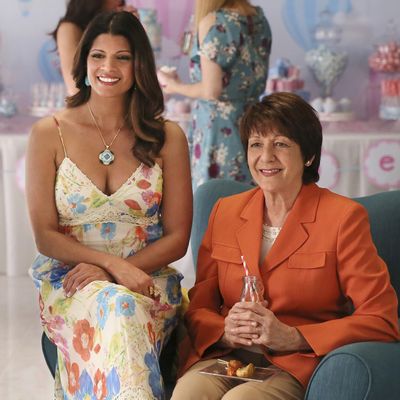
The CW’s breakout hit Jane the Virgin tells the tale of Jane Villanueva, a young woman faced with unexpected motherhood and forced to decide if it’s a role she is prepared to take on. Of course, the series, which wraps up its first season Monday, is also a delightful blend of situational comedy, telenovela, and family drama, so Jane’s decision is hardly born out of a simple unexpected pregnancy, and instead involves an accidental insemination, a long-lost love, an international crime ring, and no less than a half-dozen murders.
But all of that drama and intrigue merely serves as a façade for the true soul of the show: the Villanueva family itself. Jane the Virgin presents a powerful image of modern matriarchy throughout its first season. Jane, her mother Xiomara, and her abuela, Alba, are the foundation of love and support the entire series revolves around, a fact that makes their relationships with each other all the more fascinating. Each of the women represents a different face of single motherhood, though not always in the most traditional interpretation. It’s an aspect of the show the mind rarely lingers on because of how functionally this intergenerational family operates as a multifaceted, parenting unit.
Alba is a widow and, despite each episode of Jane the Virgin featuring a flashback, we’ve never seen her deceased husband. So for the viewing audience, we’ve never seen Alba as anything other than a woman caring for her grown daughter and granddaughter as a single mother. She is the voice of conventional wisdom, but also open-minded and supportive of Jane’s and Xiomara’s unconventional choices. Xiomara got pregnant at 16 and, despite her mother suggesting she do otherwise, decided to keep the baby. Giving birth at such a young age froze Xiomara in a lot of ways, capturing her in a place where she was unable to realize her dreams yet unable to truly let them go, resulting in a lot of seemingly immature behavior (dressing too young, embarrassing Jane in public due to her actions), not because she was selfish, but because she was forced into adulthood so suddenly that she didn’t have a chance to grow into it.
Jane, then, is the product, more than anything, of these two remarkable women. She is fiercely loving and passionate. She is hard-working and unable to give up on her dreams, even when she suspects they may be untenable. And she makes the decision to keep her unborn child because she is confident in her ability to not only raise it, but in the idea that she will never be alone, so long as she has her family there to help her.
These women, all products of their time, are representations of the shifting ideas on single motherhood through recent history. Alba’s journey is seen as tragic and unavoidable and the only acceptable version of single motherhood for many years. Xiomara’s journey was more tempestuous, carrying with her the burden of teenage motherhood and the implied shame that accompanies living with your parents after a certain age. Jane falls somewhere in between: purity intact with her accidental insemination, leaving her blameless with regard to her circumstance. Yet her choice to keep the child remains inconceivable to some, forcing her to compromise her future for a life she doesn’t have to live.
Each character synthesizes the societal expectations placed upon them and subverts them by acting as a formidable matriarchal unit. It doesn’t matter what the outside world thinks of any of their decisions or situations, so long as they have each other to love and guide them on the path they’ve chosen. As the first season wraps up, the men in their lives feel tangential to the tightly bound, fiercely protective circle they’ve created. It’s not so much that the Villanueva women don’t need men; it’s that they desperately need each other.




